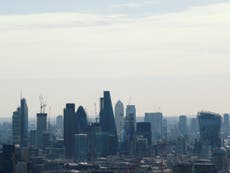Gordon Brown is right – we've been ignoring the cause of a new financial crisis for decades
The collapse of the banks in 2008-10 will be nothing to the collapse of the British state’s ability to fund itself, pay its debts, its age bill and its vast obligations in the 2020s

About 10 years ago, during the global financial crisis, with stock markets plunging and banks going bust all around him, Gordon Brown, then prime minister, got up in the House of Commons and declared “we have saved the world”, to much derision. He misspoke, as so often. He meant that his policies of free lending and bank nationalisation had “saved the banks”. It was an approach that he and Mervyn King, then governor of the Bank of England, pioneered and was adopted across the world, notably by the rather flat-footed American authorities, who had made the grim error of allowing Lehman Brothers to go bust a decade ago this week.
Now Gordon is back, telling us that we are “sleepwalking” into a new crisis, because the international financial and economic cooperation of his time is evaporating. Though he is still politic enough not to name names, we all know who to blame: that big orangey bloke across the Atlantic. Or, if you prefer, the spin doctors and voters who put Donald Trump where he is now.
In fact, though it pains me to say it (I was never a fan), Brown was right then and is right now. He did save the world economy. His warnings about the future of the world economy now are valid.
If there is one “new factor” that we can point to being different from the circumstances when the Brexit referendum was held in the summer of 2016, it is that the world trade order is disintegrating.
“Global Britain” might or might not be a sound idea, but it has no chance of happening in a world of trade wars. Read Bob Woodward’s brilliant book Fear to understand how close Trump came to tearing up the trade accord with South Korea, for example. He was prevented from doing so because officials hid the draft letter to the president of South Korea. Sadly, they are not always so light fingered, and Trump is capable of rupturing world trade for as long as he is mucking about in the White House or on Twitter.
Such are the “known unknowns” as that other Donald – Rumsfeld – might say. But don’t financial crises arise from “unknown unknowns”? Will the source of the next financial crisis be impossible to predict?
Mark Carney – King’s successor as Bank of England governor – recently gave an interview in which he boldly identified four new challenges for the UK. They were: high levels of household debt; a no-deal Brexit; instabilities in China; and cyber-attacks.
Thus, when the Queen next asks her governor of the Bank of England “why did no one see it coming?” he can say: “We did, ma’am, we did. We just couldn’t do anything about it”.
Seeing a problem coming, true, isn’t the same as defusing it, or being assured of success in dealing with it when it has hit you. Like a hurricane, there is only so much humans can do in certain circumstances; there will be damage. Even though we issue warnings about Brexit or beg the Chinese to reform their economy, that doesn’t mean that the disaster can or will be averted or ameliorated. It is for the rest of us to Brexit-proof our lives, and take whatever other precautions we can for calamities that might happen.
Which brings me to the paradox of the next financial crisis. It will not be some extreme low-risk event out of the blue – in the famous phrase of that book by Nassim Taleb so fashionable around 10 years ago, a “black swan”. It will not be in the financial or private sector, and it will not be something that is remotely a shock. It won’t even trouble the banks much. We have been watching it arrive for many decades: it is demography and, specifically, the inability of the British to plan, save and fund their care in old age. We are approaching that crisis as surely as there will always be death and taxes. Or, more accurately, old age, ill health and public spending.
The next crisis will erupt – and no deal-Brexit could easily be a trigger – in the public finances. The strains grow every year, and we use improvised measures to deal with it – making people sell their homes and so on. It is so politically toxic it helped the Conservatives lose their majority at the 2017 general election. So politicians will simply not touch it, just as they ignored the last coming crisis with the banks (Sir Vince Cable being a rare and honourable exception).
Brexit, and especially the no-deal variety, will soon put insupportable pressure on the exchequer that will build over the coming decade. Tax revenues, from the City, skilled jobs in manufacturing and much else, will be way down; welfare spending will go up, exacerbated by the disaster that is universal credit and borrowing will rise – but will hit a limit set by our already substantial national debt.
Even an independent Bank of England will see inflation rise beyond the 2 per cent target as the currency sinks. We have had such crises in the past, as in 1976 when the UK had to be rescued by the IMF, and we will have them again, as the pressures on public spending grow as relentlessly as the tax base shrinks and the credit rating of HM Treasury is downgraded.
I am in good company in my pessimism. In the less reported parts of his intervention the other day (when he declared the government “incompetent” over Brexit), Mervyn, now Lord, King said this: “The biggest economic problems facing the UK are, we save too little, we haven’t worked out how to save for retirement, the pension system is facing I think a real challenge, we haven’t worked out how to save enough for the NHS and finance it, we haven’t worked out how we’re going to save enough to provide care for the elderly.”
So that, then, is where the next existential financial crisis will turn up, and, as I say, it should be no shock to anyone. A white swan event, I suppose, gliding towards us but something we’ve become so used to ignoring that we seem to have stopped being able even to see it. The collapse of the banks in 2008-10 will be nothing to the collapse of the British state’s ability to fund itself, pay its debts, its age bill and its vast obligations in the 2020s. Plenty of nations – like banks – have gone bust in history, you know. Don’t be surprised when Britain does.







Join our commenting forum
Join thought-provoking conversations, follow other Independent readers and see their replies